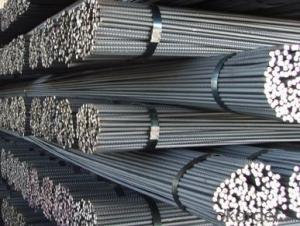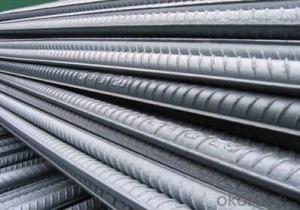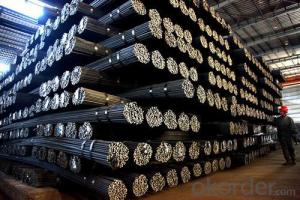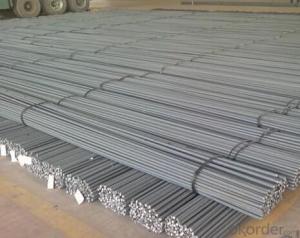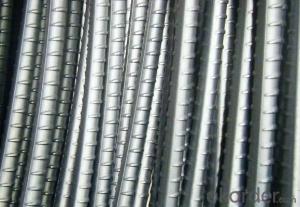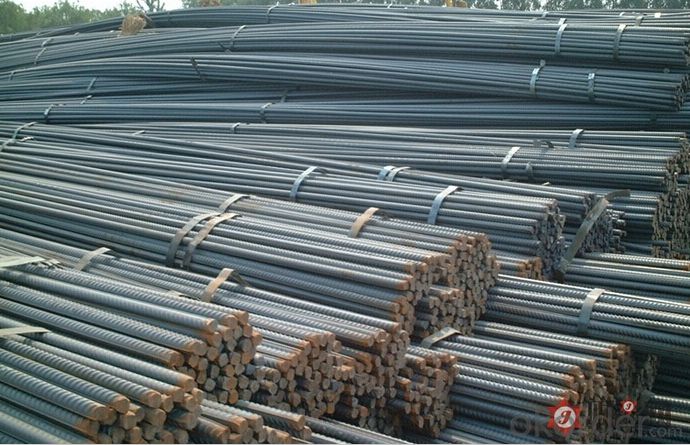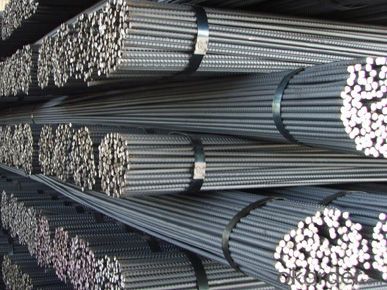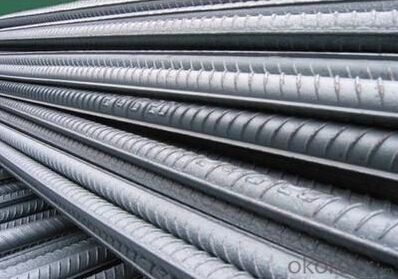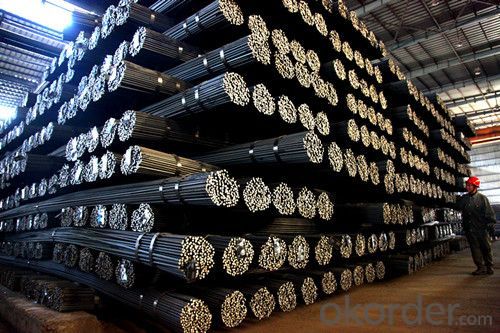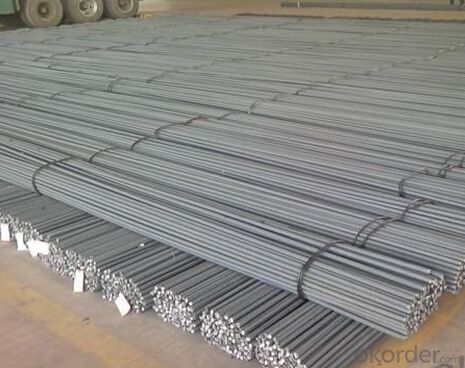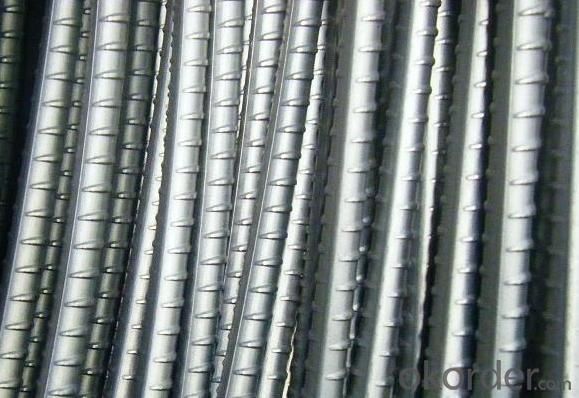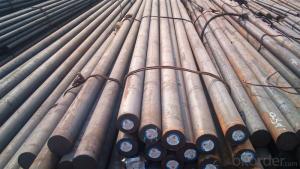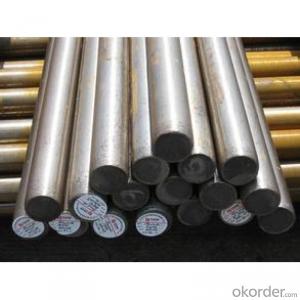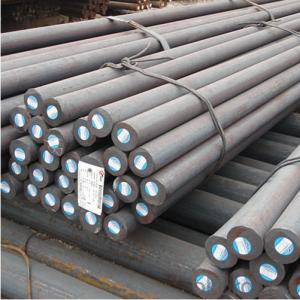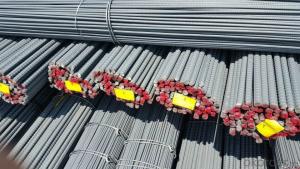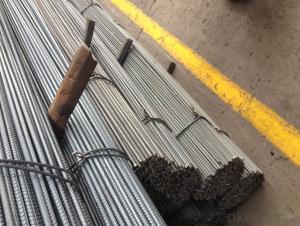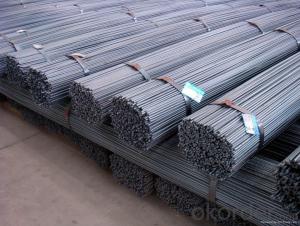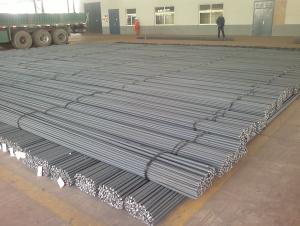Grade HRB400 HRB400E Deformed Steel Bars Prices
- Loading Port:
- Tianjin
- Payment Terms:
- TT or LC
- Min Order Qty:
- 50 m.t.
- Supply Capability:
- 10000 m.t./month
OKorder Service Pledge
OKorder Financial Service
You Might Also Like
Specification
Grade HRB400_HRB400E Deformed Steel Bars Prices
Details of Grade HRB400_HRB400E Deformed Steel Bars Prices
Name | Deformed Bar |
Shape | Round Bar |
Standard | 1.GB1499.2-2007, HRB335, HRB400E 2. ASTM A615 Gr.40, Gr.60 3.BS4449/1997 |
Diameter | 6mm-50mm |
Length | 6m, 8m, 9m,12m as standard or as request |
Test | SGS/UT 100% Elements Testing |
Certificate: | ISO/Mill Certificate |
Service: | 24 hours online service / |
more than 20 years trading and manufacture | |
Quality Assurance: | the third party inspection, such as SGS, BV, TUV…etc. is acceptable |
Packaging Details: | Seaworthy Packaging or as per customer's packing instruction |
Specification of Grade HRB400_HRB400E Deformed Steel Bars Prices
Standard | Grade | Yield Strength Mpa | Tensile Strength | Elongation% |
BS4449:1997 | 250 | 250 | 295 | 22 |
460A | 460 | 485 | 12 | |
460B | 460 | 500 | 15 | |
GB1499.2-2007 | HRB335/335E | 335 | 455 | 17 |
HRB400/400E | 400 | 540 | 17 | |
HRB500/500E | 500 | 630 | 16 | |
ASTM A615 & A615M-04a | GRADE40 | 280 | 420 | 12 |
GRADE60 | 420 | 620 | 9 | |
GRADE75 | 520 | 690 | 7 | |
JIS G3112-2004 | SD295A | ≥ 295 | 440-600 | 17 |
SD295B | 295-390 | ≥ 440 | 17 | |
SD345 | 345-440 | ≥490 | 19 | |
SD390 | 390-510 | 560 | 17 | |
SD490 | 490-625 | ≥ 620 | 13 |
Size | WEIGHT | WEIGHT | QUANTITY | ||
LENGTH 6M | LENGTH 12M | LENGTH 6M | LENGTH 12M | ||
6 | 0.222 | 1.332 | 2.664 | 751 | 375 |
8 | 0.395 | 2.37 | 4.74 | 422 | 211 |
10 | 0.617 | 3.702 | 7.404 | 270 | 135 |
12 | 0.888 | 5.328 | 10.656 | 188 | 94 |
14 | 1.21 | 7.26 | 14.52 | 138 | 69 |
16 | 1.58 | 9.48 | 18.96 | 106 | 53 |
18 | 2 | 12 | 24 | 83 | 42 |
20 | 2.47 | 14.82 | 29.64 | 67 | 34 |
22 | 2.98 | 17.88 | 35.76 | 56 | 28 |
25 | 3.85 | 23.1 | 46.2 | 43 | 22 |
28 | 4.83 | 28.98 | 57.96 | 35 | 17 |
32 | 6.31 | 37.86 | 75.72 | 26 | 13 |
36 | 7.99 | 47.94 | 95.88 | 21 | 10 |
40 | 9.87 | 59.22 | 118.44 | 17 | 8 |
50 | 15.42 | 92.52 | 185.04 | 11 | 5 |
CNBM Introduction of Grade HRB400_HRB400E Deformed Steel Bars Prices
CNBM International Corporation is the most import and export platform of CNBM group(China National Building Material Group Corporation) ,which is a state-owned enterprise, ranked in 270th of Fortune Global 500 in 2015.
With its advantages, CNBM International are mainly concentrate on Cement, Glass, Iron and Steel, Ceramics industries and devotes herself for supplying high quality series of refractories as well as technical consultancies and logistics solution.
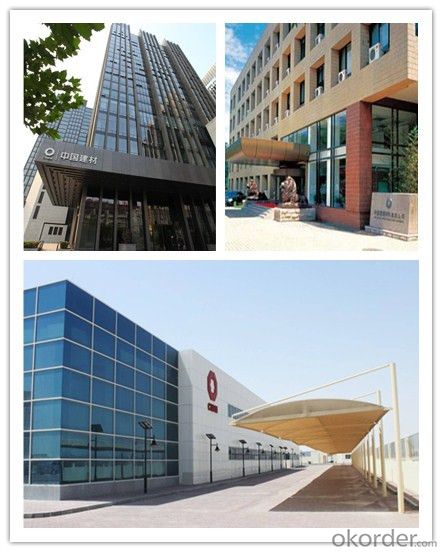
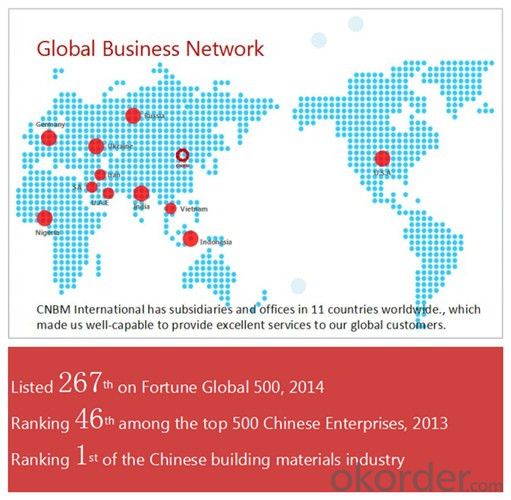
Packaging & Delivery Grade HRB400_HRB400E Deformed Steel Bars Prices
Packaging Detail | Sea worthy packing /as per customer's packing instruction |
Delivery Detail | 15 ~ 40 days after receiving the deposit |
Products Show
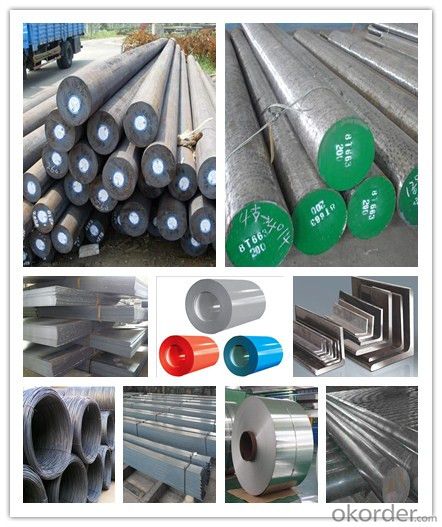
FAQ:
Are you a trading company or manufacturer? | Manufacturer |
What’s the MOQ? | 3 metric ton |
What’s your delivery time? | 15-35 days after downpayment received |
Do you Accept OEM service? | Yes |
what’s your delivery terms? | FOB/CFR/CIF |
What's the Payment Terms? | 30% as deposit,70% before shipment by T/T |
Western Union acceptable for small amount. | |
L/C acceptable for large amount. | |
Scrow ,Paybal,Alipay are also ok | |
Why choose us? | Chose happens because of quality, then price, We can give you both. Additionally, we can also offer professional products inquiry, products knowledge train (for agents), smooth goods delivery, excellent customer solution proposals. |
What's your available port of Shipment? | Main Port, China |
What’s your featured services? | Our service formula: good quality+ good price+ good service=customer's trust
|
Where are your Market? | Covering more than 160 countries in the world |
- Q: How does special steel perform in extreme environments?
- Special steel is specifically designed to perform exceptionally well in extreme environments. It has superior resistance to corrosion, high temperatures, and pressure, making it highly reliable and durable. This type of steel can withstand harsh conditions such as extreme cold, intense heat, and corrosive chemicals, ensuring optimal performance and longevity even in the most challenging environments.
- Q: What are the different surface treatment methods for special steel?
- Some of the different surface treatment methods for special steel include heat treatment, coating or plating, polishing, shot blasting, and passivation. Heat treatment involves subjecting the steel to specific temperatures and cooling processes to alter its properties. Coating or plating involves applying a layer of another material, such as zinc or chrome, to protect the steel from corrosion. Polishing is done to create a smooth and glossy surface finish. Shot blasting is a process that involves using abrasive materials to remove impurities and create a textured surface. Passivation is a chemical treatment used to remove iron contaminants and improve corrosion resistance. These methods can be utilized individually or in combination to enhance the surface characteristics of special steel.
- Q: What are the properties of martensitic steel?
- Martensitic steel is a specific type of stainless steel that possesses several distinct properties. It is known for its high strength, hardness, and wear resistance, making it suitable for applications where toughness and durability are crucial. Additionally, martensitic steel can be easily heat treated to enhance its mechanical properties, such as increasing its strength or improving its corrosion resistance. However, it has lower corrosion resistance compared to other stainless steel types and can be prone to cracking under certain conditions.
- Q: How does special steel contribute to the aerospace safety?
- Special steel contributes to aerospace safety in several ways. Firstly, special steel alloys such as titanium and stainless steel are used in the construction of critical components like landing gear, engine parts, and structural elements. These alloys offer high strength-to-weight ratios, corrosion resistance, and excellent heat resistance, ensuring the durability and reliability of aerospace structures. Moreover, special steel plays a crucial role in manufacturing precision instruments and tools used in aerospace maintenance and repair. These tools are essential for maintaining the safety and functionality of aircraft, ensuring accurate measurements, and facilitating effective repairs. Furthermore, special steel is utilized in the production of safety-critical fasteners, such as bolts and screws, which hold various aircraft components together. These fasteners need to withstand extreme forces and vibrations during flight, and special steel materials provide the necessary strength and durability to ensure their reliability. Overall, the use of special steel in aerospace applications enhances the safety of aircraft by providing robust and reliable materials for construction, maintenance, and repair, ultimately contributing to the overall integrity and performance of aerospace systems.
- Q: What are the properties of shock-resistant steel?
- Shock-resistant steel is a type of steel that possesses certain properties that make it highly resistant to shock or impact. These properties include high toughness, strength, and ductility. It can absorb and distribute the energy generated by an impact, thus preventing the material from fracturing or breaking. Additionally, shock-resistant steel often has a high hardness, which further enhances its ability to withstand sudden loads and impacts without deforming or failing. These properties make shock-resistant steel suitable for applications that require protection against heavy impacts, such as in construction, automotive, and military industries.
- Q: What is the significance of tensile strength in special steel?
- Tensile strength is of great significance in special steel because it determines the steel's ability to withstand stretching or pulling forces without breaking or deforming. This property is crucial in various industries, especially in manufacturing and construction, where high tensile strength is required for structural integrity and safety. Special steel with superior tensile strength can withstand heavy loads, resist impacts, and provide durability, making it highly sought after in applications such as building infrastructure, automotive manufacturing, and aerospace engineering.
- Q: Can special steel be used in the chemical processing equipment manufacturing industry?
- Yes, special steel can be used in the chemical processing equipment manufacturing industry. Special steel is designed to withstand extreme temperatures, corrosion, and pressure, making it an ideal material for manufacturing chemical processing equipment where these factors are prevalent. Its high strength and resistance to chemical reactions make it suitable for various applications such as reactors, storage tanks, and pipelines in the industry.
- Q: How does special steel perform in high-temperature creep conditions?
- Special steel performs well in high-temperature creep conditions due to its unique composition and properties. It exhibits excellent resistance to deformation and maintains its strength and integrity even at elevated temperatures. The high alloy content and specialized heat treatment processes contribute to its ability to withstand prolonged exposure to extreme temperatures without significant deformation. This makes special steel an ideal choice for applications where high-temperature creep resistance is crucial, such as in power generation, aerospace, and petrochemical industries.
- Q: How does special steel perform in cryogenic corrosion resistance?
- Special steels possess exceptional capabilities in terms of resisting corrosion in cryogenic environments. Unlike regular steels, which tend to become brittle and prone to corrosion when exposed to extremely low temperatures, special steels are specifically engineered to endure such conditions while maintaining their mechanical properties and corrosion resistance. The remarkable performance of special steels in cryogenic settings can be primarily attributed to their composition and microstructure. These steels are typically infused with elements like nickel, molybdenum, and nitrogen, which significantly enhance their ability to withstand corrosion at low temperatures. Additionally, the microstructure of special steels is meticulously controlled, resulting in a fine grain size and a uniform distribution of alloying elements. This microstructure contributes to the steel's capacity to resist corrosion and retain its mechanical strength even in cryogenic temperatures. Furthermore, special steels undergo rigorous testing procedures to ensure their suitability for cryogenic applications. They are subjected to low-temperature impact tests, which evaluate their toughness and resistance to brittle fracture. These tests verify that the steel can endure the stresses and strains imposed by cryogenic conditions without experiencing failure. In conclusion, special steels exhibit exceptional resistance to cryogenic corrosion due to their distinct composition, microstructure, and comprehensive testing. They are the preferred choice for applications that demand reliable performance in extremely low temperatures, such as in the aerospace, energy, and scientific research industries.
- Q: How does special steel contribute to the defense industry?
- Special steel contributes to the defense industry in various ways. Its exceptional strength, durability, and resistance to extreme conditions make it a crucial material for manufacturing components used in military vehicles, aircraft, and naval vessels. Special steel is also used in the production of armor plates and ballistic protection systems, providing enhanced protection to soldiers and military equipment. Additionally, its corrosion resistance properties make it ideal for constructing submarines, missiles, and other critical defense infrastructure. In summary, special steel plays a vital role in ensuring the reliability, performance, and safety of defense equipment, making it an indispensable asset for the defense industry.
Send your message to us
Grade HRB400 HRB400E Deformed Steel Bars Prices
- Loading Port:
- Tianjin
- Payment Terms:
- TT or LC
- Min Order Qty:
- 50 m.t.
- Supply Capability:
- 10000 m.t./month
OKorder Service Pledge
OKorder Financial Service
Similar products
Hot products
Hot Searches
Related keywords

